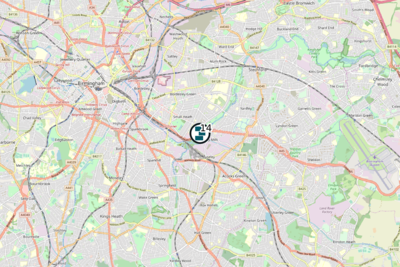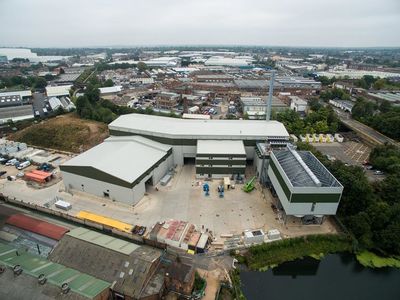Birmingham Bio Power: Difference between revisions
m minor text changes |
m minor text changes |
||
| Line 18: | Line 18: | ||
==Tonnage Input/Fuel== | ==Tonnage Input/Fuel== | ||
The tonnage received by the plant is reported as [[Wood Waste]] in the most recent [[Annual Sustainability Report]] for 2018-19<ref>[https://www.ofgem.gov.uk/publications-and-updates/biomass-sustainability-dataset-2018-19 Biomass Sustainability Dataset 2018-19]</ref>. Because the plant is an [[Advanced Conversion Technology]] and produces a [[Syngas]] the sustainability report talks in terms of the gas input to the energy recovery system, rather than the unprocessed [[Wood Waste]] into the plant, which was 287,870,574 cubic meters. | The tonnage received by the plant is reported as [[Wood Waste]] in the most recent [[Annual Sustainability Report]] for 2018-19<ref>[https://www.ofgem.gov.uk/publications-and-updates/biomass-sustainability-dataset-2018-19 Biomass Sustainability Dataset 2018-19]</ref>. Because the plant is an [[Advanced Conversion Technology]] and produces a [[Syngas]] the sustainability report talks in terms of the gas input to the energy recovery system, rather than the unprocessed [[Wood Waste]] into the plant, which was 287,870,574 cubic meters. | ||
The [[Wood Waste]] is exclusively supplied by [[Jack Moody Envirofuels Limited]] which sources much of the [[Wood Waste]] from [[Waste Disposal Authorities]]. The [[Wood Waste]] tonnage received and recorded in the [[EA]] statistics for the calendar year (i.e. January 2018 to December 2018) was ''' | The [[Wood Waste]] is exclusively supplied by [[Jack Moody Envirofuels Limited]] which sources much of the [[Wood Waste]] from [[Waste Disposal Authorities]]. The [[Wood Waste]] tonnage received and recorded in the [[EA]] statistics for the calendar year (i.e. January 2018 to December 2018) was '''59,945''' tonnes. | ||
==References== | ==References== | ||
<references/> | <references/> | ||
Revision as of 13:37, 28 April 2020
| Error: no local variable "site" has been set. Error: no local variable "status" has been set. | |
 See Biomass EfW → page for a larger UK Wide map. | |
| Operator | Error: no local variable "operator" has been set. |
| Capacity | Error: no local variable "capacity" has been set. MWe |
| Feedstock | Error: no local variable "mainfeed" has been set. |
| EPR (Waste Licence) | Error: no local variable "epr" has been set. |
| ROC | Error: no local variable "roc" has been set. |
| CfD | Error: no local variable "cfdcap" has been set. |
| CHP | Error: no local variable "chp" has been set. |
Operators Annual Report
Input Data
| Year | Wood | Litter | RDF | Other | Total |
|---|
Output Data
| Year | IBA | IBA %ge of Tot IN | APC | APC %ge of Tot IN |
|---|

Summary
A Biomass EfW facility based on processing up to 67,000 tonnes per annum of Wood Waste producing 10.3 MWe gross power to be exported to the national grid after the facility’s own energy requirements are met. The facility is located in Tyseley in Birmingham, adjacent to Tyseley ERF. The Wood Waste feedstock is sourced locally through a contract with Jack Moody Envirofuels Limited[1].
The facility was developed by CoGen, who continue to provide management services, and is operated by Engie. Birmingham Bio Power became operational at the start of 2016[2].
Plant
The facility utilises Nexterra’s fixed-bed updraft Gasification system technology, which is an Advanced Conversion Technology. MWH Treatment provided EPC services for the project[3].
The project has an estimated cost of £47.8m which was financed Green Investment Bank (GIB), Balfour Beatty, Eternity Capital Management, Foresight’s UK Waste Resources and Energy Investments (UKWREI) fund, and Carbonarius’s GCP Infrastructure Fund (GCP)[1].
This facility has been replicated by its sister project Welland Bio Power.
Tonnage Input/Fuel
The tonnage received by the plant is reported as Wood Waste in the most recent Annual Sustainability Report for 2018-19[4]. Because the plant is an Advanced Conversion Technology and produces a Syngas the sustainability report talks in terms of the gas input to the energy recovery system, rather than the unprocessed Wood Waste into the plant, which was 287,870,574 cubic meters. The Wood Waste is exclusively supplied by Jack Moody Envirofuels Limited which sources much of the Wood Waste from Waste Disposal Authorities. The Wood Waste tonnage received and recorded in the EA statistics for the calendar year (i.e. January 2018 to December 2018) was 59,945 tonnes.
References
- ↑ 1.0 1.1 Power Technology, 2016. Birmingham Bio Power Plant, Tyseley - Power Technology | Energy News and Market Analysis. Online. [Accessed 3 April 2020.]
- ↑ CoGen, 2018. Projects — Cogen. Online. CoGen. [Accessed 3 April 2020.
- ↑ Nexterra, 2014. Birmingham Bio Power Ltd. Online. Nexterra.ca. [Accessed 3 April 2020.]
- ↑ Biomass Sustainability Dataset 2018-19
